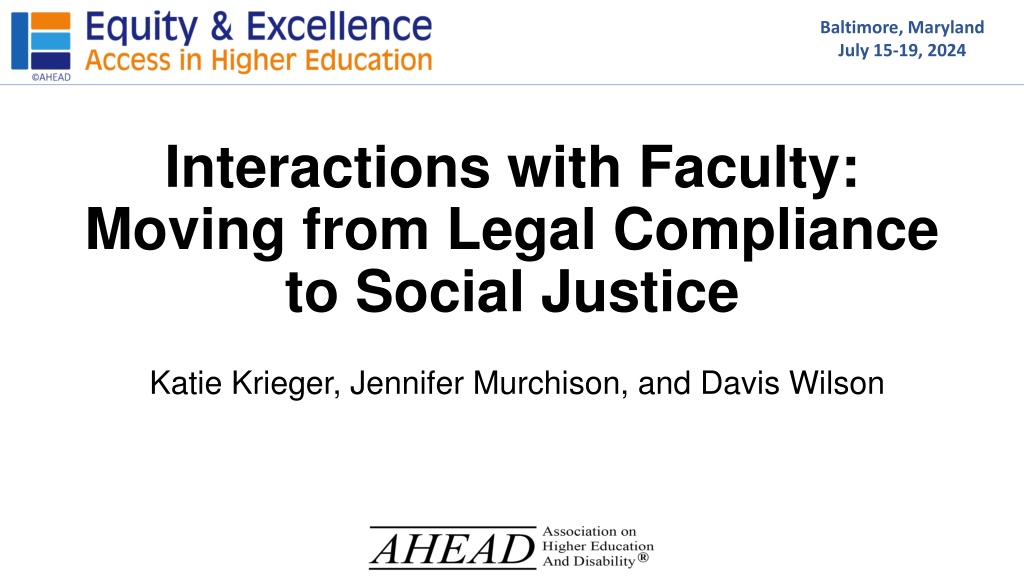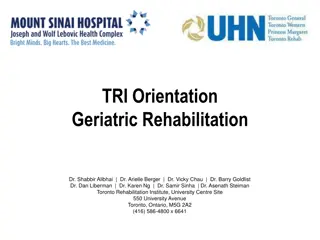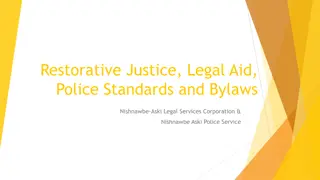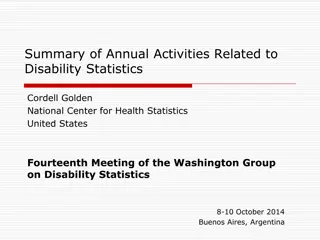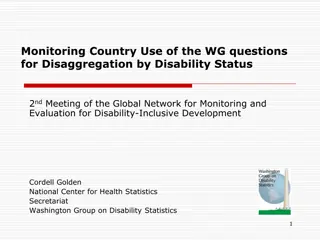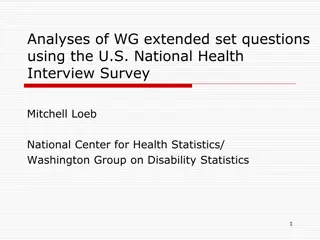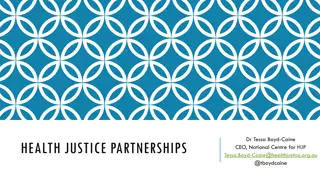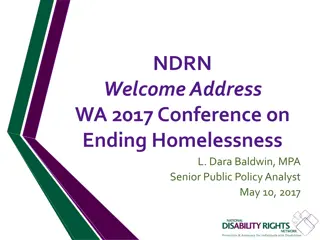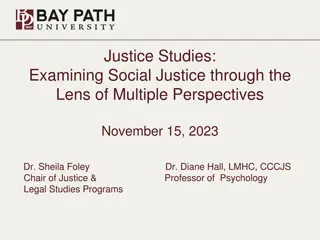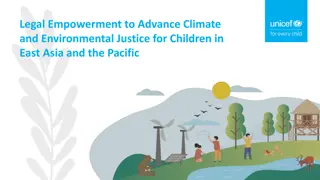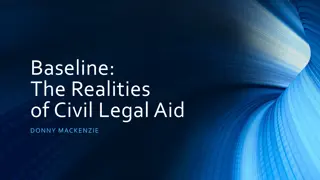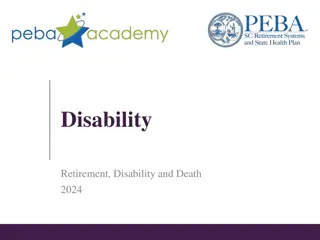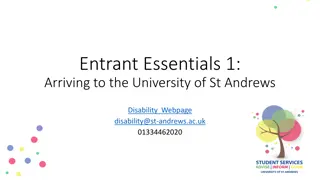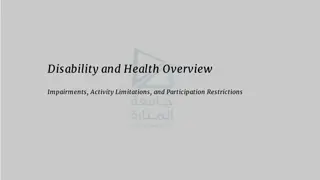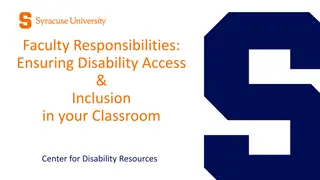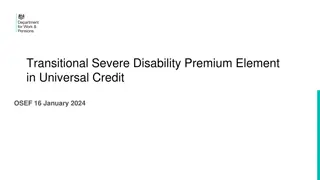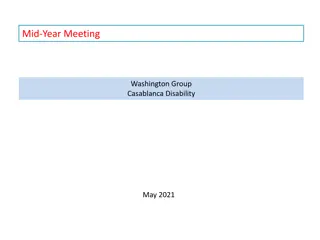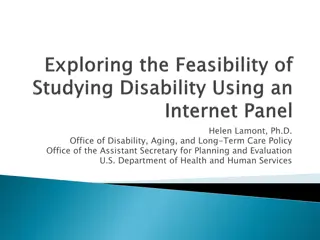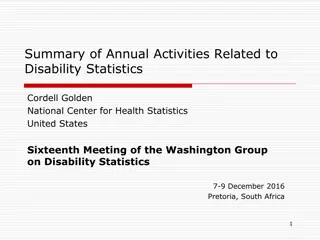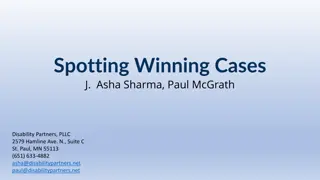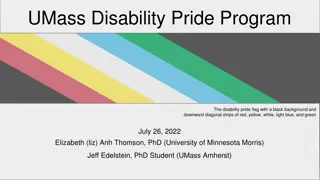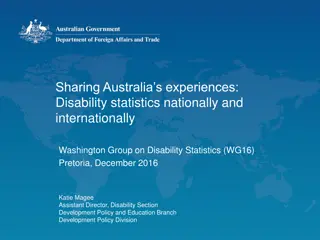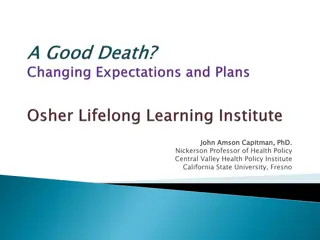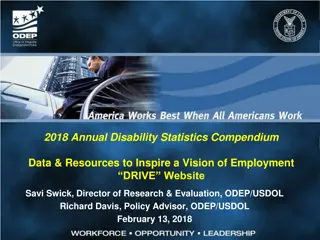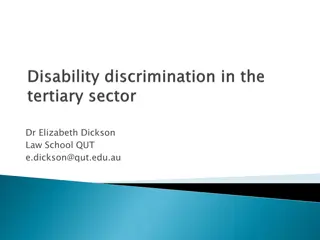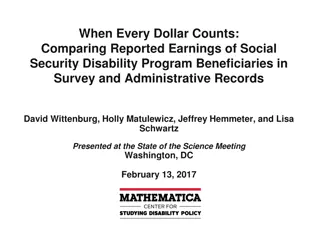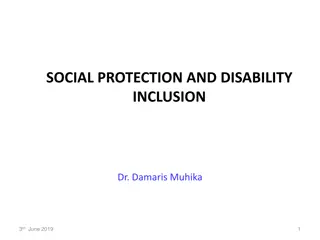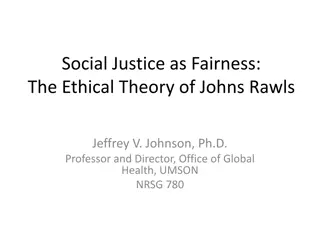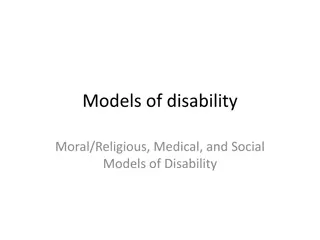Advancing Disability Justice: From Legal Compliance to Social Justice
Explore the journey from legal compliance to social justice in disability rights with insights from Katie Krieger, Jennifer Murchison, and Davis Wilson at the Baltimore conference. They discuss definitions, the Medical Model, and the general approaches towards disability accommodations, urging a shift towards a more inclusive and just system.
Download Presentation

Please find below an Image/Link to download the presentation.
The content on the website is provided AS IS for your information and personal use only. It may not be sold, licensed, or shared on other websites without obtaining consent from the author. Download presentation by click this link. If you encounter any issues during the download, it is possible that the publisher has removed the file from their server.
E N D
Presentation Transcript
Baltimore, Maryland July 15-19, 2024 Interactions with Faculty: Moving from Legal Compliance to Social Justice Katie Krieger, Jennifer Murchison, and Davis Wilson
Baltimore, Maryland July 15-19, 2024 Conference Civility Statement We ask you to join us in creating a culture that reflects Access and Inclusion and Civility and Respect this week and in all aspects of our organization.
Baltimore, Maryland July 15-19, 2024 Introductions Katherine (Katie) Krieger oDirector, Disability Resource Center oUniversity of North Carolina Wilmington Jennifer Murchison oExecutive Director for Universal Access & Inclusion oADA Coordinator in the Office for Disability Justice oCalifornia State University, Sacramento Davis Wilson oAssistant Director of Disability Support Services oEast Carolina University
Definitions (for the purpose of this presentation) Compliance: discrimination against individuals with disabilities is prohibited, required to make reasonable modifications to provide equal access. Middle of the Road: the process of providing equitable access through a continuum between compliance and social justicepractices. Social Justice: review the environment and what needs to change there; disability justicegoes deeper: recognizes the intersectionality of multiply- marginalized communities; includes the experiences of being "disabled and..."; recognizes how diverse systems interact and reinforce oppression Disclaimer: this is simply our opinions and experiences. It doesn t mean one approach is right/wrong/more/less correct than any other. We want to provide you with a broader picture to compare and contrast and form your own conclusions about what will work best for your office.
Will we ever get away from the MedicalModel? So long as documentation with diagnoses and/or treatment plans are "needed", probably not. Problems with Medical Model: oCentered on person's perceived deficiencies oThe inherent "-ism"sof healthcare Racism, Sexism Sizeism, Genderism Ableism, Classism oAccess to quality healthcare (particularly in the United States)
General Approaches Compliance Focus on functional limitations of the student s disability and reasonable accommodations to address them. Often reactive rather than proactive, providing accommodations/ access once requested. Social Justice Focus on access/inaccessibility of environment The ways history has oppressed, subjugated disabled individuals in addition to other marginalized, intersectional identities (being "disable d and...") should inform our approaches - correcting historical segregation, lack of education on disabled rights, disabled history, disabled struggle Middle of the Road Split focus between students, faculty and the campus Focus on the functional limitations of students once they request accommodations Partnership with faculty and staff around the universitytofoster support through universal- design concepts
Possible Accommodation Letter Language Compliance "The student is eligible for services under the ADA as amended and Section 504 as amended. Under these laws, the University is obligated to provide appropriate reasonable accommodations to students with disabilities." Focused on legal requirement to provide reasonable accommodations partnership first Middle of the Road ECU is committed to access for students with disabilities. DSS is a resource to fulfill this commitment and by partnering with you, we ensure students experience access in their coursework through reasonable accommodations as required by the ADA. Touching on compliance, but highlighting the Social Justice "The student has identified some areas of this course/program/event which are inaccessible. These may be corrected withthefollowing accommodations: (insert).The DS Office and faculty will continue working with student to ensure accommodations are working like the student needs them to." Highlightsthesubjective nature of access, as well as potential solutions being multifaceted andshared responsibility of all in an interactive process.
Faculty Training Compliance Middle of the Road Social Justice Creating training videos focused on disability history, disability rights movements, identifying disability justice Collaborating with Center for Teaching and Learning on how to make courses (online and in- person) more accessible from the design stage Collaborating with IT to ensure web presence - including teaching platforms - are accessible (digital and formatted/layouts) Limited options for faculty training about disability. Centered on providing accommodations oReactive rather than proactive Tutorials: oExtending time oAdding or enabling captions (accommodation) Few trainings/workshops oBy invitation oMix between reactive and proactive Developing oNew leadership oAssessment of faculty perspective/ne ed Tutorials on website: oExtending time oUDL oAssistive Technology oUsing Clockwork
Course Specific Accommodations Compliance "Leniency with attendance when feasible" Public Speaking accommodation oFocus on the student's substantial limitation and the course requirements around public speaking to find a way to accommodate the student Middle of the Road "Reasonable Attendance Adjustment Plan" Programs with technical standards oScuba oAllied Health Sciences/ Medical/Dental Social Justice Access is extremely subjective: what is accessible for one will not be accessible for another Design of courses and programs take inclusion into more consideration: o options for assessments rather than one method only tests versus essays or papers mixture of multiple choice and essay questions on a test o group work versus solo project
Fundamental Alteration Discussion Compliance Conversation is centered around course objectives and reasonable accommodations. Alternative accommodations may be discussed. Little to no focus on course design as a potential barrier, and little emphasis on UDL or other options to improve course access for all. Middle of the Road Understand what the courseobjectives are How is the course/program designed? Are there alternative accommodations or UDL considerations that can be implemented? Social Justice If the course/program isdesigned with accessibility and inclusion in mind... is there still a fundamental alteration? It'salready in the design of the course Still mustconsider any requests for accommodations and engage in the interactive process We got 99 problems, but the build ain't one.
Faculty Expectations/Responsibilities Social Justice Don't futz around with Academic Freedom! Faculty are responsible for making surecourses are accessible, accommodations "fix this but the faculty can design more intentionally We are not telling faculty what to teach or how to teach we'rehelping them learn how to make it accessible! Compliance Provide approved accommodations Direct students who request accommodations directly from faculty back to the Disability Resource Center. Middle of the Road Provide approved accommodations for student. Communicate with DSS if there are questions about implementing accommodations. Not an expectation or responsibility oFaculty work with studentswithout communicating with DSS oMore flexibility
Moving Beyond Compliance Using the compare and contrast we ve done in the previous slides, think about where your institution falls and what adjustments you might want to make if you are trying to move toward social justice. Also, do you think you re practicing one model, but realizing that you might be somewhere else entirely? Are you moving between the models - and is that sometimes needed? (spoiler alert: yes)
Baltimore, Maryland July 15-19, 2024 Questions?
Baltimore, Maryland July 15-19, 2024 Presenter Information Katie Krieger KriegerK@uncw.edu Jennifer Murchison Murchison@csus.edu Davis Wilson WilsonDav21@ecu.edu
Baltimore, Maryland July 15-19, 2024 Future AHEAD Conferences 2025 Conference 2026 Conference Rhode Island Convention Center Providence, RI July 20-24, 2026 Sheraton Denver Denver, CO July 14-18, 2025
Baltimore, Maryland July 15-19, 2024 Thank you for attending!
